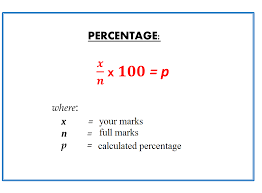When I was in school calculating my exam marks per cent was my first task after my examination. Every student of colleges or schools wants to know his percentage of marks so that he or she can know what division they got in 10th, 12th board exam or any other college or university exam. Calculation of marks percentage sometimes becomes confusing, especially for a student who is not good at mathematics. Here I am giving you a step-by-step method of calculating the percentage of obtained marks in a particular exam.
What is a percentage?
A percentage is nothing but a fraction ratio of any number. It is denoted by the symbol % (Percent). Let’s make it more simple, If 100 is a number then 50 of a hundred (50/100) is called the 50% of 100. If we change the number from 100 to 1000 then the 50 Percent of 1000 will be 5000, which is also half of the number 1000. If we divide the number 1000 by 4 we will get 25% of the number 1000. In marks percentage calculation you can assume the Total of each paper’s marks as 100% and then you can easily calculate your percentage of marks without using any formula. Suppose the total marks of each subject is 400 and you obtain a total of 300 marks after adding all paper numbers. So here 400 is now 100%, 200 is now 50% and 40 is 10%. Now let’s calculate the total 50% (for 200 marks)+20% (for 80 marks)+5% (for remaining 20 marks). Now add all your marks which are now become 300 and add all your per cent marks which are now become 75%. This is the simplest way of doing percentages calculation in a fraction manner.
The formula for calculating the percentage of any number
Here is the simple formula for calculating the per cent of a number. You can use this formula to calculate the percentage of any number.
Formula:
Percentage, % = (Value / Total Value) × 100
How to calculate the % of marks obtained in board exam
In each class students wants to calculate their exam marks per cent. The calculation depends on how many subjects marks you are adding to get your final result. In some classes like CBSE 10th board class or CBSE, 12th board class subject numbers may vary from stream to stream. Some students may have only 5 subjects while some may have 6 subjects.
Steps to calculate the percentage of marks
- Add all the obtained marks and divide it by the maximum marks of the exam test.
- multiple this number with 100 and you will get the desired per cent.
For example to calculate the per cent of the mark
Let a student obtain total of 540 marks in 6 different subjects out of 600 maximum marks. Then the percent will be calculated like: % of marks = (540/600)*100
% of marks = 90%
Marks Percentage Formula:
To calculate the percentage from marks, you can use the following formula:
Percentage = (Obtained Marks / Total Marks) x 100
Here’s how to use the formula:
- Determine the total marks for the subject or exam. For example, let’s say the total marks are 100.
- Determine the marks obtained by the student. For example, let’s say the student scored 85 marks.
- Plug the values into the formula: Percentage = (85 / 100) x 100
- Simplify the equation: Percentage = 0.85 x 100
- Calculate the percentage: Percentage = 85%
So, in this example, the student’s percentage based on the obtained marks is 85%.
Please note that this formula calculates the percentage out of the total marks available for the subject or exam. The result represents the portion of marks obtained by the student in relation to the maximum marks possible.
FAQ’s On Percentages and Marks Relationship
Certainly, here are some frequently asked questions (FAQs) related to marks and percentages in the context of academics and assessments:
- What is the relationship between marks and percentages? Marks represent the numerical scores obtained in assessments, while percentages are a way to express those marks in relation to the total possible marks, scaled to 100.
- How is a percentage calculated from marks? To calculate the percentage from marks, divide the obtained marks by the total marks possible and then multiply by 100.
- What’s the significance of percentages in academics? Percentages provide a standardized way to compare performance across different assessments and subjects, helping to gauge a student’s level of understanding.
- How are grades often assigned based on percentages? Educational institutions typically have grade ranges corresponding to different percentage ranges. For example, an A might correspond to 90-100%, a B to 80-89%, and so on.
- What does it mean to score 100% in an assessment? Scoring 100% indicates that a student has answered all questions correctly and achieved the highest possible marks.
- How do I convert my marks into GPA (Grade Point Average)? GPA is typically calculated on a scale of 4.0. Convert your percentage to GPA by using a conversion chart provided by your institution or applying a GPA calculation formula.
- Is it possible to score more than 100% in an assessment? While the maximum possible marks are usually 100, some assessments might offer extra credit, allowing students to exceed 100% for going above and beyond the requirements.
- What’s the difference between absolute grading and relative grading? Absolute grading assigns grades based on a fixed scale (e.g., 90-100% = A), while relative grading compares a student’s performance to that of their peers, potentially resulting in a curve.
- How do you calculate the average percentage for multiple assessments? Calculate the average by adding the percentages of all assessments and dividing by the total number of assessments.
- Can I convert my percentage to a letter grade for different grading systems? Yes, different institutions and regions might have varied grading scales. Conversion charts are often available to help you map your percentage to the corresponding grade.
- What’s the difference between a weighted percentage and a regular percentage? Weighted percentages take into account different categories or components within an assessment, each contributing differently to the final score.
- How can I improve my percentage in academics? Consistent studying, time management, seeking help when needed, and understanding the subject matter deeply are effective ways to improve your percentage.
- What’s considered a good percentage in academics? This can vary based on educational standards and institutions. Generally, percentages above 80% are often considered good or excellent.
- How do I calculate the percentage increase in marks from one assessment to another? Calculate the percentage increase by using the formula: ((New Marks – Old Marks) / Old Marks) * 100.
- Are percentages the only way to evaluate academic performance? No, while percentages are common, educational institutions might use other assessment methods like grades, GPAs, narrative evaluations, and rubrics.
- How do I convert my percentage to a CGPA (Cumulative Grade Point Average)? CGPA is an average of GPAs across different semesters. Convert your percentage to GPA for each semester and then calculate the average for CGPA.
- Can I compare my percentage in one subject to another subject? Yes, percentages provide a standardized way to compare performance between different subjects, allowing you to identify strengths and areas for improvement.
- What is the “passing percentage” in an assessment? The passing percentage is the minimum percentage required to successfully pass an assessment, which can vary based on educational institutions and specific requirements.
- How do I calculate my overall percentage for an academic year? Sum up the total marks obtained in all assessments and divide by the total possible marks, then multiply by 100.
- Do percentages solely reflect academic abilities? No, percentages might not fully capture a student’s skills, creativity, critical thinking, or other qualities that contribute to holistic learning and personal development.
Read More
Will it be sufficient to study NCERT to crack NEET?
CA Foundation Exam Preparation Tips
5 Reasons To Study B.Sc Animation Course
How to choose the best online classes for CBSE class 11th?
Top 10 Toughest Exams in India


